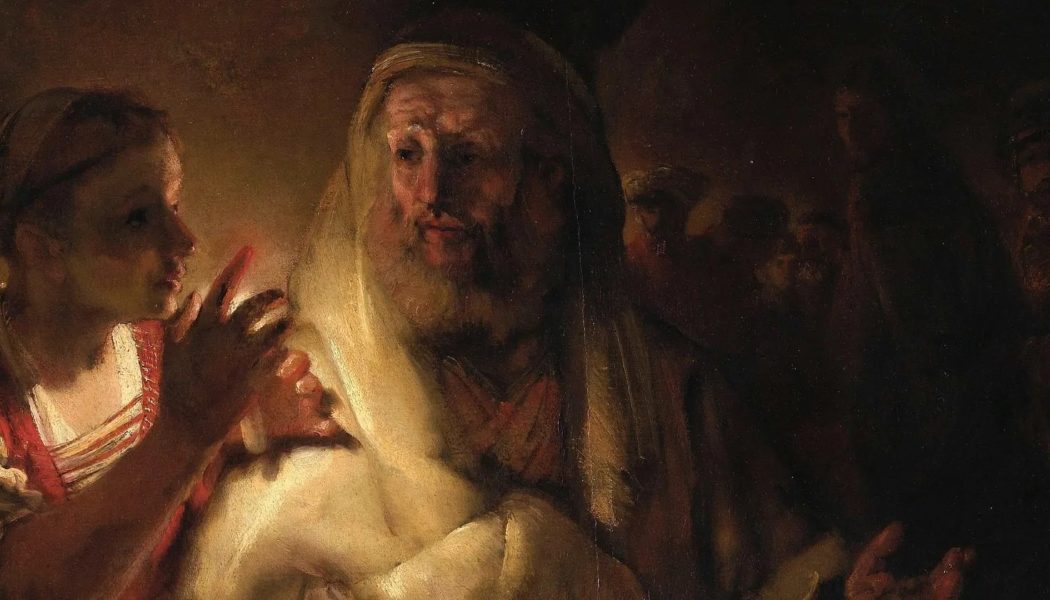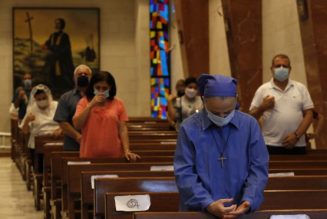
Life is hard, and there is no “safe space” — as much as we would like there to be. That’s what Jesus tells the apostles on the Sixth Sunday of Easter Year A.
The only way to find comfort in life is to live it generously. God isn’t found in the bunker; he is found in the open battlefield.
Jesus tells his Apostles (and us) that he will send the Holy Spirit, but the Holy Spirit is always on the move: We see him as the wind, a dove, and fire.
The Gospel passage for this Sunday immediately follows last Sunday’s, and continues its theme. After Jesus announced that one of his closest followers will hand him over to be crucified and that their leader would deny him, Jesus told the Apostles “Do not let your hearts be troubled.”
But that seems strange. How could they not let their hearts be troubled? Last week, we got one answer: Jesus was like a hero crouching next to wounded soldiers in battle, promising he would make a way to safety then return to rescue them.
This week, Jesus teaches them where strength comes from in the meanwhile: From the Holy Spirit, the Comforter, or “Advocate,” who will “be with you always.” But the Holy Spirit is the dynamic love between the Father and Son. The Holy Spirit doesn’t ease your troubled heart by telling you everything is going to be okay — it will not be okay, in fact, and he knows that. The Holy Spirit comforts you by having your back when you take risky steps out into the strife.
In fact, to have the Holy Spirit’s comfort, Jesus says you can’t crouch and wait. You have to get up and step out in love, truth and communion.
- Take love first. “If you love me, you will keep my commandments,” says Jesus. He defines real love as love that does what the Beloved wishes. If you want comfort amid the world’s darkness, the first thing to start doing is God’s will.
- Second, truth. To prophesy is to speak according to “the Spirit of truth, whom the world cannot accept.” Insisting on your truth or capitulating to the world’s truth won’t help you: Only real truth comforts, the challenging truth of God.
- Third, communion. “I am in my Father and you are in me and I in you,” Jesus says. That only happens the hard way, by a real communion of heart, mind and will with God’s. First, communion means accepting Jesus Christ’s body, blood, soul and divinity into yours in church, but then it means offering your body, blood, soul and humanity to him out in the world.
In other words, the Holy Spirit doesn’t come to you as you shelter in place. The Spirit who is always on the move comes when you are on the move too — he marches with you when you fight; he fills your mind when you speak hard truths; and he is in you when you leave comfort behind to follow Christ.
St. Peter, eventually knew exactly what this meant.
The apostle who betrayed Christ failed every one of the commands Jesus gives about the Holy Spirit here.
- Peter confused love for dramatic promises, rashly professing his undying devotion. Only later did he learn that real love means “feed my sheep.”
- Peter didn’t have the courage to speak the truth even to a servant girl. Eventually, he learned to be willing to die for the truth.
- Peter rejected communion with the suffering Christ and lashed out with his sword instead. Later, he learned what he proclaims in today’s Second Reading: Jesus “suffered for sins … that he might lead you to God.”
Peter is the classic example of how the Holy Spirit helps those who are calm and confident, not those who are frightened and embarrassed. After the Passion, Peter was waiting in a defensive crouch, hoping to be rescued from the bad guys. After Pentecost, when he received the Holy Spirit, he began risking his neck for his faith — and only then did he find peace and joy.
Sunday’s Second Reading is a letter written by a St. Peter who finally gets it. He tells his flock to “Always be ready to give an explanation to anyone who asks you for a reason for your hope.” The words “always” and “anyone” are important — they show utter confidence in the Holy Spirit. Give a reason for hope to anyone, even those who will hate you for it; anywhere, even in the trial that will kill you for it — because the Holy Spirit will rush to your side.
St. Peter also understands that the Holy Spirit is love, and that the most effective argument is the most loving one. St. Peter says to defend the faith “with gentleness and reverence, keeping your conscience clear, so that, when you are maligned, those who defame your good conduct in Christ may themselves be put to shame.”
Love your opponent enough to respect her with your words; love God enough to respect him with your actions. That’s Peter’s advice, co-written by the other author of Scripture, the Holy Spirit.
Our own Confirmation gives us all the advantages Jesus and Peter show here.
Confirmation “gives us a special strength of the Holy Spirit to spread and defend the faith by word and action as true witnesses of Christ, to confess the name of Christ boldly, and never to be ashamed of the Cross,” says the Catechism, neatly summing up the advice of the Gospel and Second Reading this Sunday.
Then, in its “In Brief” section on Confirmation, you’ll find the second half of Sunday’s Second Reading, quoted verbatim. To prove that Confirmation is Scriptural, the Catechism says:
1315 “Now when the apostles at Jerusalem heard that Samaria had received the word of God, they sent to them Peter and John, who came down and prayed for them that they might receive the Holy Spirit; for it had not yet fallen on any of them, but they had only been baptized in the name of the Lord Jesus. Then they laid their hands on them and they received the Holy Spirit.”
In other words, together, Sunday’s readings are a summary of the Sacrament of Confirmation’s origin, meaning and purpose.
But we need to take it one step further.
What was true for the Apostles is true for us. The Sacrament of Confirmation is a supernatural channel of grace. The graces it gives — love, truth and unity with God — are guaranteed, on one condition. We have to cooperate with them.
You don’t get them in church. They start there, but for lay people, they come alive in our efforts to raise the eyes of the temporal realm to God in our workplaces, homes and communities. Try it — go to the Holy Spirit with a thorny problem, and ask the answer. The answer will be “serve,” “trust,” and “accept;” never “fear,” “lash out,” or “get even” — and never “lie,” for the Holy Spirit is a “Spirit of truth.”
And these graces Jesus gives us in the Holy Spirit don’t end there, either. They end in heaven.
“He did all of this in order to transform earthborn human beings into holy and heavenly beings,” said Clement of Alexandria, “thus bringing to fulfillment that divine utterance, ‘Let us make man in our own image and likeness.’ And, in truth, Christ became the perfect realization of what God spoke, and the rest of humanity is conceived as being created merely in his image.”
In other words, the Holy Spirit makes us partakers of the divine nature. Satan lied and said “You shall be like gods.” But what Satan offered through, confirmation delivers through obedience.
We get everything we want — love, peace, joy, and courage — by uniting with God in the Holy Spirit. But he only gives us what we want if we risk what we already have, for him.








![Whole Woman’s Health v. Jackson: Read the Supreme Court opinions here [PDF]…](https://salvationprosperity.net/wp-content/uploads/2021/09/whole-womans-health-v-jackson-read-the-supreme-court-opinions-here-pdf-327x219.gif)
